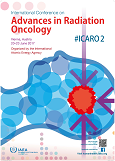Speaker
Shiro Obata
(Nagasaki Prefecture Shimabara Hospital)
Description
Introduction of the study:
We have experienced a new multidisciplinary treatment strategy for advanced rectal cancers: a chemo-radiotherapy with a new radio-sensitizer, which is antioxidant enzymes-targeting drug to induce hypoxic cancer cells (a cause of treatment resistance) re-oxygenation, infusion by endoscopic guide with the approval of our Ethical Review Board and evaluated the safety and the efficacy of the new treatment. Herein, we report these outcome.
Methodology:
Between October 2014 and August 2015, we treated 5 advanced rectal cancer patients with the chemo-radiotherapy and the radio-sensitizer infusion by endoscopic guide. Treatment radiation dose for the primary lesion and relative lymph nodes area under prone position with a berry board was ranged from 39.6 Gy to 50.4 Gy. The chemotherapy was S-1 80-100 mg/body in three patients, and FOLFOX6 (bolus and infusion fluorouracil and leucovorin with oxaliplatin) with bevacizumab in one and without bevacizumab in one patient. Endoscopic radio-sensitizer injections into primary rectal lesions were done twice a week until the last irradiation.
Results:
The Median follow-up time is 19 months. Two patients received surgical resection after the new treatment demonstrated pathological complete responses, respectively. The other three patients did not have indications for surgery; stage 4 in two, and high age, heart failure and dementia in one. In the formers, endoscopic rectal biopsies showed local pathological complete responses after the treatment for 17 and 11 months respectively, and the latter denied follow-up endoscopic examination after the treatment, but anal pain and rectal hemorrhage have disappeared for 18 months. There have been no severe adverse events in both acute and late phase, except grade 3 acute ileitis of one patient received FOLFOX6 with bevacizumab.
Conclusion:
We hope this minimally invasive and safe treatment will be a new option as a curative treatment strategy for rectal cancer. A further accumulation of many cases is needed.
| Institution | Department of Radiology and Radiotherapy, Nagasaki Prefecture Shimabara Hospital |
|---|---|
| Country | Japan |
Author
Shiro Obata
(Nagasaki Prefecture Shimabara Hospital)
Co-authors
Mikio Yamanishi
(Nagasaki Prefecture Shimabara Hospital)
Tomayoshi Hayashi
(Nagasaki Prefecture Shimabara Hospital)

